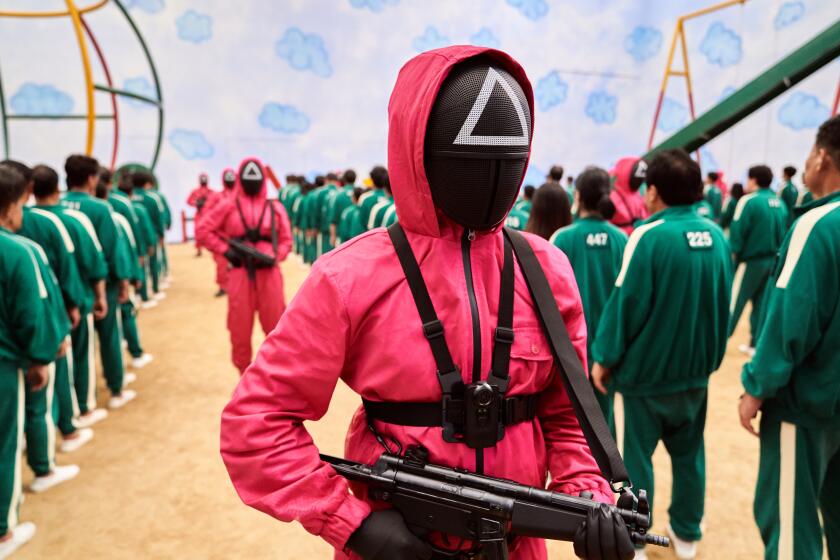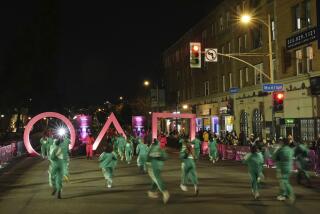What did these ‘Squid Game’ stars love most about the series?

- Share via
Lee Jung-jae, the star of Netflix’s biggest hit ever — the South Korean limited series “Squid Game,” in which financially desperate contestants such as his divorced-dad character Gi-hun risk their lives for money by playing childhood games — says he could tell when filming the first episode that the show, which may return for a second season given its popularity, was onto something.
“I was like, ‘Ah, in Korea, this is going to be a hit,’” recalls Lee. “Did I know it was going to be an international tsunami? No.”
Neither Lee nor co-stars Park Hae-soo, who plays a debt-shackled investment broker, and Jung Ho-yeon, in her acting debut as a scrappy young pickpocket, predicted the wave of popularity. But they all remember how excited they were by the opportunity to portray complicated people in an imaginative scenario, they say through an interpreter.
In Screen Gab No. 7, we tackle Korea’s surprise streaming hit, diagram the battle of the Britney docs and discuss “Diana: The Musical.”
“I’ve always been interested in characters that have good and bad, that duality,” says Lee. “Gi-hun enjoys gambling, he’s jobless, in debt, not a good family member, kind of a loser. But there’s a part of him you cannot dislike too much, and I wanted to highlight that. The dark and the light, the ugliness and the fun.”
Park, whose character Sang-woo is Gi-hun’s childhood friend but also an antagonist in a game of survival, says every role had that duality. “In working with [Hwang Dong-hyuk, the show’s writer-director], we worked on that modulation. It’s not something that can be shown when a character stands alone. It was amplified because of the ensemble. That’s when you get complexities.”
It’s why it’s hard to imagine a richer first acting job than Jung’s as guarded North Korean defector Sae-byeok, but she had no idea what she was in for when the audition for “Squid Game” came her way. A top-tier model who’d gone from placing second in South Korea’s version of “Next Top Model” to walking runways internationally for Louis Vuitton and Chanel, Jung was firmly ensconced in New York and preparing for Fashion Week when the enigmatic audition scenes arrived. Though Jung had been looking to make the transition to acting, she was expecting her new management team to place her at an acting academy, not put her up for a big part.
“I prepared a lot,” she says of the tape she made. “I barely slept, I couldn’t eat much. I wanted to do it right, but it didn’t mean I had to be cast. I just wanted some judgment for my performance so I can improve. But two days after I sent the audition tape, they said the director wanted to see me in person in Korea. I was like, ‘Wow, another adventure!’”
Looking back now, she remembers how she could hardly get any words out when meeting Hwang, who asked few questions to begin with. “But I think it helped,” she says, “because Sae-byeok doesn’t talk that much, she’s very much by herself, and because I didn’t speak much at the audition, I think the director could see me as Sae-byeok. Also, I’d barely slept, so I had these dark circles under my eyes, and I looked terrible. Just like Sae-byeok!”
All three actors spoke of how safe they felt in Hwang’s hands. Lee, who’s had a varied acting career in Korean film and television over 25 years, says on a typical project he would have hung around on set during his non-shooting days to watch other actors. “In this case, I had a lot of trust for director Hwang that he was going to balance everything out, so I kept myself separate,” he says, to keep an element of surprise for himself during filming. When he eventually took in the totality of the completed series, he felt good about the decision. “It made my character seem more dramatically heightened, the acting became more crystallized.”
Park concurs that Hwang created an atmosphere that allowed him to focus on his character and that it also made watching it later like experiencing it anew. “It was really interesting to see the pacing, the colors, how the characters flowed and developed. That was quite surprising.”
What was always clear to the actors was the show’s critique of the real world as a ruthless place. But they also hope viewers take away the more positive message they understood from it. Lee points to his character’s line about how trusting in people isn’t out of need. “They must help each other in order to survive,” says Lee. “That’s how I actually view the message of ‘Squid Game.’ The real world we’re living in, it could actually be more cruel than the TV version. But we know there are many methodologies and ways to live together in harmony.”
Park partly attributes the success of “Squid Game” to the audience connecting to the reality inside what’s fantastical, from the relatable archetypes they play — young and broke, failed and drowning, looking successful but really not — to the situation they’re put in.
“It’s popular internationally because these characters are within a competitive structure, and everybody recognizes that structure,” Park says. “But, personally, I would love for a time to come where people don’t relate to this oppressive, competitive structure. That’s my personal wish.”
More to Read
From the Oscars to the Emmys.
Get the Envelope newsletter for exclusive awards season coverage, behind-the-scenes stories from the Envelope podcast and columnist Glenn Whipp’s must-read analysis.
You may occasionally receive promotional content from the Los Angeles Times.











